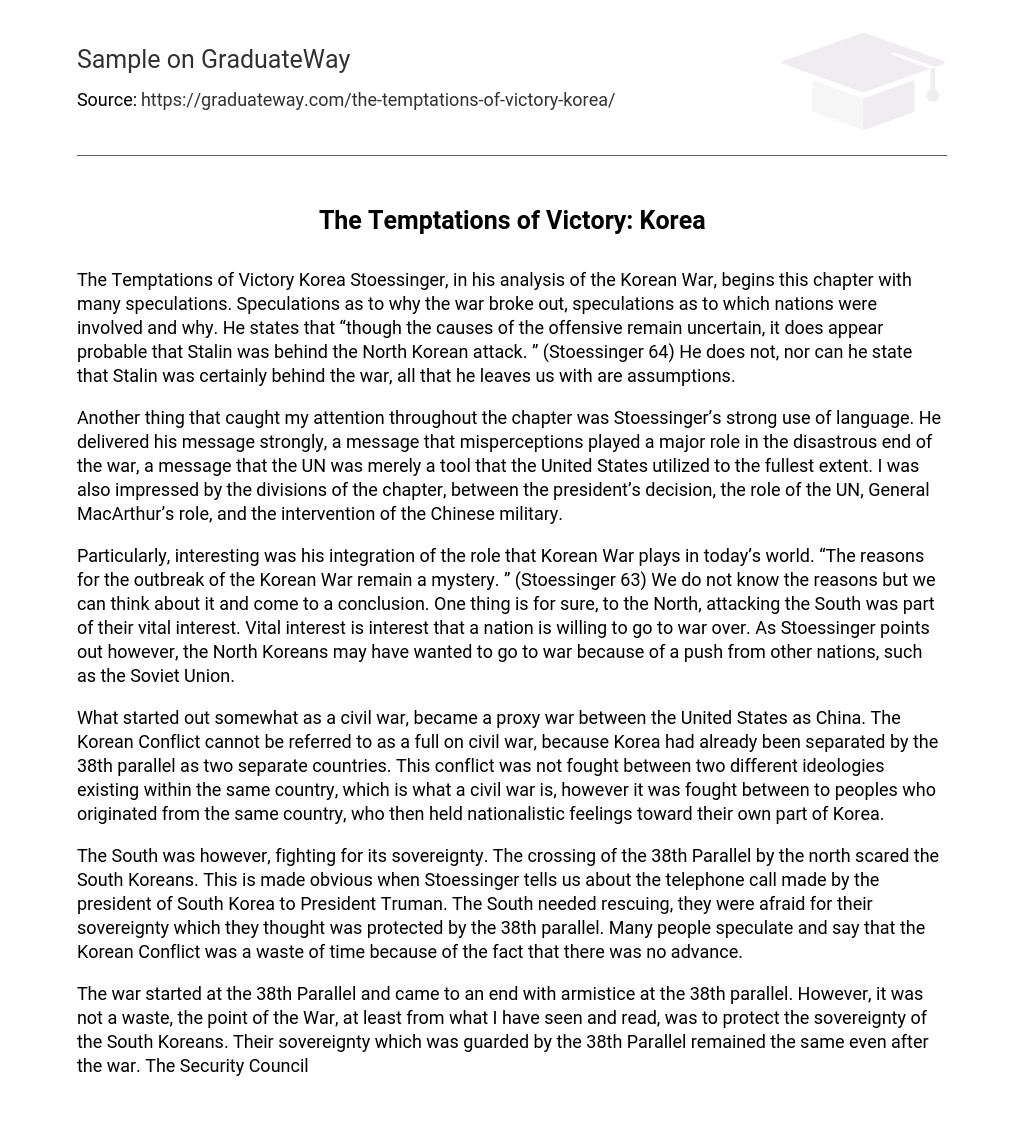The Temptations of Victory Korea Stoessinger, in his analysis of the Korean War, begins this chapter with many speculations. Speculations as to why the war broke out, speculations as to which nations were involved and why. He states that “though the causes of the offensive remain uncertain, it does appear probable that Stalin was behind the North Korean attack. ” (Stoessinger 64) He does not, nor can he state that Stalin was certainly behind the war, all that he leaves us with are assumptions.
Another thing that caught my attention throughout the chapter was Stoessinger’s strong use of language. He delivered his message strongly, a message that misperceptions played a major role in the disastrous end of the war, a message that the UN was merely a tool that the United States utilized to the fullest extent. I was also impressed by the divisions of the chapter, between the president’s decision, the role of the UN, General MacArthur’s role, and the intervention of the Chinese military.
Particularly, interesting was his integration of the role that Korean War plays in today’s world. “The reasons for the outbreak of the Korean War remain a mystery. ” (Stoessinger 63) We do not know the reasons but we can think about it and come to a conclusion. One thing is for sure, to the North, attacking the South was part of their vital interest. Vital interest is interest that a nation is willing to go to war over. As Stoessinger points out however, the North Koreans may have wanted to go to war because of a push from other nations, such as the Soviet Union.
What started out somewhat as a civil war, became a proxy war between the United States as China. The Korean Conflict cannot be referred to as a full on civil war, because Korea had already been separated by the 38th parallel as two separate countries. This conflict was not fought between two different ideologies existing within the same country, which is what a civil war is, however it was fought between to peoples who originated from the same country, who then held nationalistic feelings toward their own part of Korea.
The South was however, fighting for its sovereignty. The crossing of the 38th Parallel by the north scared the South Koreans. This is made obvious when Stoessinger tells us about the telephone call made by the president of South Korea to President Truman. The South needed rescuing, they were afraid for their sovereignty which they thought was protected by the 38th parallel. Many people speculate and say that the Korean Conflict was a waste of time because of the fact that there was no advance.
The war started at the 38th Parallel and came to an end with armistice at the 38th parallel. However, it was not a waste, the point of the War, at least from what I have seen and read, was to protect the sovereignty of the South Koreans. Their sovereignty which was guarded by the 38th Parallel remained the same even after the war. The Security Council of the United Nations obviously played an extremely important part in this war. All of the representatives for the nations that had to be there were there, except for the Soviet Union.
They claimed to be “boycotting the Security Council to express its opposition to the presence of Nationalist China. ” (Stoessinger 69) However the boycotting of the Soviet Union was suspicious and Stoessinger makes sure to point this out. He goes on to state that the assistant secretary of state states that “the relationship between the Soviet Union and the North Korean [was] the same as that between Walt Disney ad Donald Duck. ” (Stoessinger 70) This statement implies that just as Walt Disney created the character of Donald Duck, the Soviet Union had created the character of North Korea.
A major turning point in this conflict was the intervention of Communist China. For much of the war, the United States did not entertain even the slightest idea of an intervention by the Chinese Military. However China was developing into a power and wanted to be recognized as such. To completely throw a nation to the side like that and to not even acknowledge how powerful it can become is dangerous. It is dangerous because part of a nation’s sovereignty is recognition by other nations, and by ignoring China, it was a threat to its sovereignty.
Even though, statements were made even in the New York Herald Tribune proclaiming that this military action was not against China, the UN forces’ advances came extremely close to the Chinese border. So this further played a role in threatening the sovereignty of the Chinese people. Of course the UN was not intending to do this but the misperceptions of the UN by China and vice versa led to the intervention of China on the side of the North Koreans, and made the war impossible to win.
This war as Stoessinger points out at the end of the chapter has had after effects on the world today. It still effects the perceptions that North Korea and the United States have about each other. Tensions between the two rise and fall and it is certainly unknown what future lies ahead, but each side should take in the lesson from the past that misperceptions can be deadly and open communication is the only thing that can deter any further conflict.





